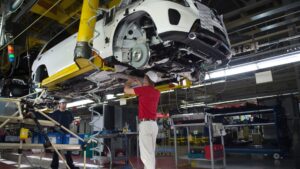Mercedes-Benz Expands Production in Alabama: A Strategic Move in a Tariff-Laden Market
In a bold move to solidify its foothold in the U.S. market, Mercedes-Benz has announced plans to introduce a new vehicle model at its Vance, Alabama plant. This initiative comes against the backdrop of President Donald Trump’s auto tariffs, which have reshaped the landscape for automakers operating in the United States.
Localization Efforts Promote Market Stability
Mercedes-Benz is taking significant steps toward "local-for-local" production—a strategy aimed at minimizing the impact of tariffs by manufacturing vehicles closer to where they are sold. Mercedes-Benz North America CEO Jason Hoff stated, "By localizing a core segment model in Tuscaloosa, we’re getting even closer to the U.S. customer." While specific details about the new vehicle remain under wraps, the announcement primarily indicates a focus on manufacturing SUVs, which has become the plant’s specialty.
The Alabama facility, already recognized as the global export hub for Mercedes-Benz SUVs, has been pivotal in the company’s U.S. operations. Approximately 60% of the SUVs assembled here are destined for international markets, proving that local production has significant implications for global sales strategies.
Understanding the Impact of Tariffs
The ongoing 25% tariffs on imported vehicles and parts, which are set to take effect soon, have prompted automakers to rethink their production strategies. While a spokesperson for Mercedes-Benz has refrained from directly linking this new production line to the tariffs, the timing suggests a strategic pivot could be in play. Localizing production mitigates risks associated with tariffs and can lead to cost savings in the long run.
For readers of the Extreme Investor Network, this move by Mercedes-Benz underscores a critical trend in the automotive industry: the shift towards localized manufacturing. Companies are increasingly weighing the costs and benefits of manufacturing near their customer base, especially in a fluctuating economic climate.
The Bigger Picture: Local Production as a Competitive Edge
As competition intensifies in the automotive sector, especially with the rise in electric vehicles and alternative automakers, local production may serve as a competitive advantage. Automakers can respond more swiftly to market demands, reduce lead times for components, and navigate regulatory changes more effectively.
What This Means for Investors and Industry Observers
For investors, the implications of this shift could be substantial. Companies like Mercedes-Benz that adapt to market conditions by investing in localized production are more likely to maintain profitability and growth. As the automotive landscape continues to evolve, keeping an eye on these production strategies could provide insights into the future performance of companies within the sector.
Conclusion
Mercedes-Benz’s announcement to localize additional vehicle production in Alabama is a strategic response to current challenges faced by the auto industry. By prioritizing local manufacturing, the company not only strengthens its connection to the North American market but also positions itself to navigate the complexities of tariffs more effectively. As the car market continues to transform, the Extreme Investor Network will keep you updated on key strategies and insights that can bolster your investment decisions. Stay tuned for more expert analysis and timely updates!

